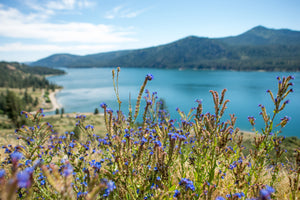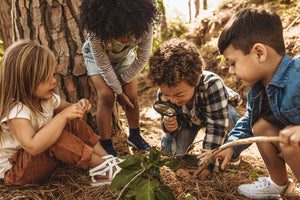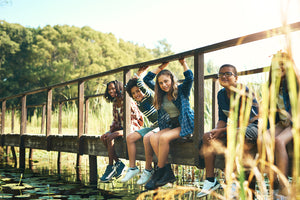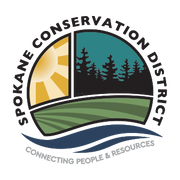
Educational Contact
Stacey Selcho
Education Coordinator
509-535-7274, ext. 217
Stacey-Selcho@SpokaneCD.org

Resources for You
Our programs bring natural resources to life with hands-on, interactive lessons designed by a certified teacher. Each activity is:
- Grade-level appropriate and aligned with Washington State standards
- Connected to classroom science for easy integration
- Free of charge for K–12 schools, homeschool groups, and youth organizations (YMCA, Boys & Girls Club, etc.)
Explore our educational programs for your students or youth group, or reach out to Stacey to schedule a workshop: Stacey Selcho, 509-535-7274 ext. 217 | stacey-selcho@sccd.org

K-12 Lessons & Programs
Explore SCD Classroom Programs
Browse our hands-on lessons and programs by clicking the subheadings below. Each description includes grade-level recommendations. For custom presentations, contact Education Coordinator Stacey Selcho.
Trout in the Classroom
- Support for teachers to set up tanks, deliver trout, and coordinate release days
- One tank can serve multiple classrooms
Wheat Week Lessons (Grades 4–5)
- Five-day series exploring wheat “from the ground up”
EnviroKids Club (Grades K–6)
- Learn about local natural resources through newsletters, events, and Clubhouse activities
- Open to individuals, Girl Scout troops, and other youth groups
- Groups may also request classroom visits
EnviroKids Partners: Spokane Regional Clean Air Agency, National Weather Service, Spokane Aquifer Joint Board, Spokane County Environmental Services, Spokane Solid Waste & City of Spokane Solid Waste, City of Spokane Water Department, Spokane Conservation District

Classroom Lessons
That’s TREE-mendous!
Students will learn why trees are some of the most amazing forms of life on the planet. They will use tree cookies to identify the structure of a tree inside out and the adaptations trees use to sustain their lives. Using dichotomous keys, students will experience how scientists identify trees and learn the major differences between trees.
Grades 3-6
Watersheds and Wetlands
Using a three-dimensional model called Enviroscape, students will learn what a watershed is, what watershed they live in, and how we affect our watershed. By making observations with the model students can see how pollution affects our watersheds, the difference between non-point and point source pollution, and why wetlands are so important. Watersheds are complex ecosystems that can be difficult to grasp, but this model brings watersheds to life.
Grades 3-8
Water – From the Ground Up
Students will learn about where their water comes from and where it fits into the water cycle. We will explore water on our planet and how we can conserve the water that we use. We also will cover any local issues that we may be facing with our water. Students will make models of their aquifer and the water cycle.
Incredible Journey
Students will review the water cycle and participate in an adapted Project WET activity that takes them around the world as water droplets. Students diagram and reflect on how they moved from place to place.
Grades 2-6
How Does Our Water Flow?
Students will learn about their aquifer and how groundwater is part of the water cycle. We will discuss the importance of soil as a filter and why it plays such a large role in cleaning our drinking water. Students will be able to observe how groundwater moves through a large groundwater flow model and how pollution can affect our groundwater.
Grades 5-8
It’s a Soilabration!
Students will learn more about soil formation, soil biology, and the important role that soil has in our watersheds. We will explore weathering and erosion and the part they play in soil formation. They will also see how soil interacts with water and some of the physical properties of soil. Grades K-8
A Rock Can Be…
Students will explore different rocks, minerals, and fossils and how we use them in everyday life. We will discuss being a geologist and other careers that use rocks. Students will get some hands-on experience with rock investigations and get a take-home rock activity.
Grades K-2
Outdoor Education Experiences
For customized outdoor education experiences, please contact us directly. We’ll work with you to design a program tailored to your location, timing, grade level, and specific learning goals.
Contact: Stacey Selcho, Education Coordinator stacey@spokanecd.org • 509-535-7274
Outdoor Learning Labs
Take your classroom outside! Our free Outdoor Learning Labs give educators ready-to-use kits packed with materials for hands-on, nature-based learning.
What’s Included:
Labs cover a wide range of topics, from orienteering kits and replica animal skulls to a macroinvertebrate investigation kit—and more. Some labs are sourced from outdoor education providers, while others were designed by our staff.
👉 Reserve a Lab:
Stacey Selcho, Education Coordinator
📧 stacey-selcho@spokanecd.org | 📞 509-535-7274 ext. 217


